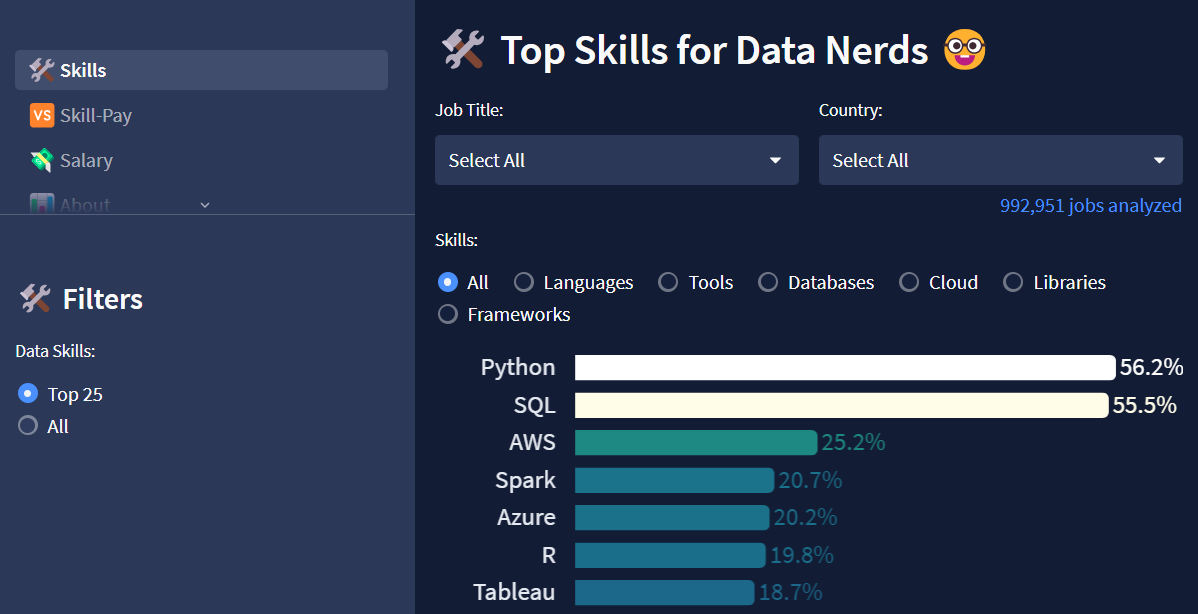Skills Employers are Looking for in Data Professionals - Australia 2023
In the ever-evolving field of data science and analytics, staying relevant means continually refining your skills and learning new ones - but the challenge is understanding what skills are in demand. With the rise of Machine Learning and AI, is it a case of learning those skills for future jobs or upskilling in current demand tools? To answer this, lets look at live job data.
Luke Barousse built datanerd.tech which 'uses data from job postings collected daily from Google’s search results (~6500 jobs/day), focusing on data science-type roles from around the globe. These postings are sent through an NLP pipeline and then aggregated daily to find the top skills and median salaries.'
GUI for DataNerd.Tech streamlit application.
The parameters were set for Australia and here's what live job data revealed what skills companies having on their job advertisements.
Languages: SQL, Python, Java
Knowledge of certain programming languages is often the first thing that employers look for in a data professional. SQL, Python, and Java often top this list.
SQL is used for interacting with databases, allowing us to retrieve, manipulate, and analyse data stored in relational systems. Despite being a relatively old language, SQL's demand is unlikely to wane anytime soon due to its powerful data manipulation capabilities and wide usage. While not the sole tool required for a position, unless you're a Database Administrator, SQL is list in over 50% of advertisements as it is a standard method of interacting with data.
Python is often widely used for its open-source nature. As a general-purpose language, Python is not only used for web and software development but has also become a favorite among data scientists and machine learning engineers. Its extensive suite of libraries such as Pandas, NumPy, and Scikit-learn make Python an invaluable tool in the data analysis and model-building process.
*It's important to note here that employers typically look for specific library use when requesting Python experience.
While Java might not be the first language associated with data roles, its performance efficiency, robustness, and widespread use in enterprise environments make it an important skill in the data landscape. Java is often used in big data technologies, with frameworks like Spark being Java-based.
Tools: Tableau, Power BI, Excel
Visualising data is a key step in making data-driven decisions, and tools like Tableau, Power BI, and Excel help turn raw data into actionable charts and graphs.
Tableau and Power BI have become industry standards for creating interactive dashboards and visual reports. Both tools have a fairly user-friendly interface and offer powerful data visualisation capabilities, making them popular among data professionals. Interestingly, in Australia - Tableau and Power BI have an even rivalry on the East Coast however on the West Coast Power BI reigns supreme.
Despite being around for decades, Excel remains a powerful tool for data analysis, especially for quick calculations, data cleaning, and basic visualisations. Its ubiquity across industries makes Excel a necessary skill for any data professional. This is one of the best tools for communicating with non-technical stakeholders.
Cloud: Azure, AWS, Databricks
With the rise of big data, cloud computing has become a necessity. Knowing how to work with cloud platforms like Azure, AWS, and Databricks is a sought-after skill.
Azure and AWS are comprehensive cloud platforms offering a multitude of services, including those for data storage, computation, and advanced analytics. Both platforms have managed solutions for data analytics that allow data professionals to focus more on deriving insights and less on managing infrastructure. Microsoft and AWS both have certificates available for those wanting to prove their knowledge.
Databricks is a unified data analytics platform built around Apache Spark. It allows for easier big data processing and machine learning on cloud platforms and is used by many organisations for its collaborative workspace.
Conclusion
Instead of learning COBOL, a now largely obsolete language, for example, focusing on in-demand languages and technologies will likely yield more tangible career benefits. The goal isn't to master every language or tool but to understand the landscape and focus on building a versatile skill set that aligns with your career goals and market demand.
The skills listed above are by no means exhaustive, and specialisation within any area is always valuable. But hopefully, this will provide some guidance on where to focus your learning and development efforts. It's important to keep in mind that learning for the sake of learning can be less beneficial without a targeted approach.

